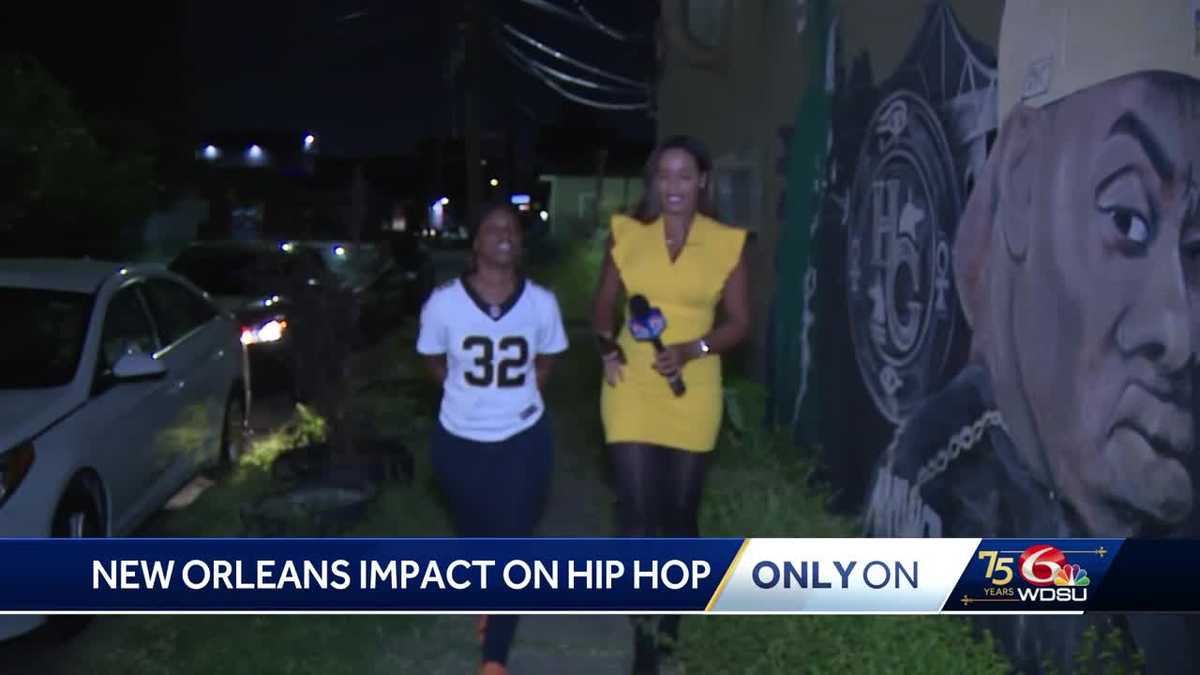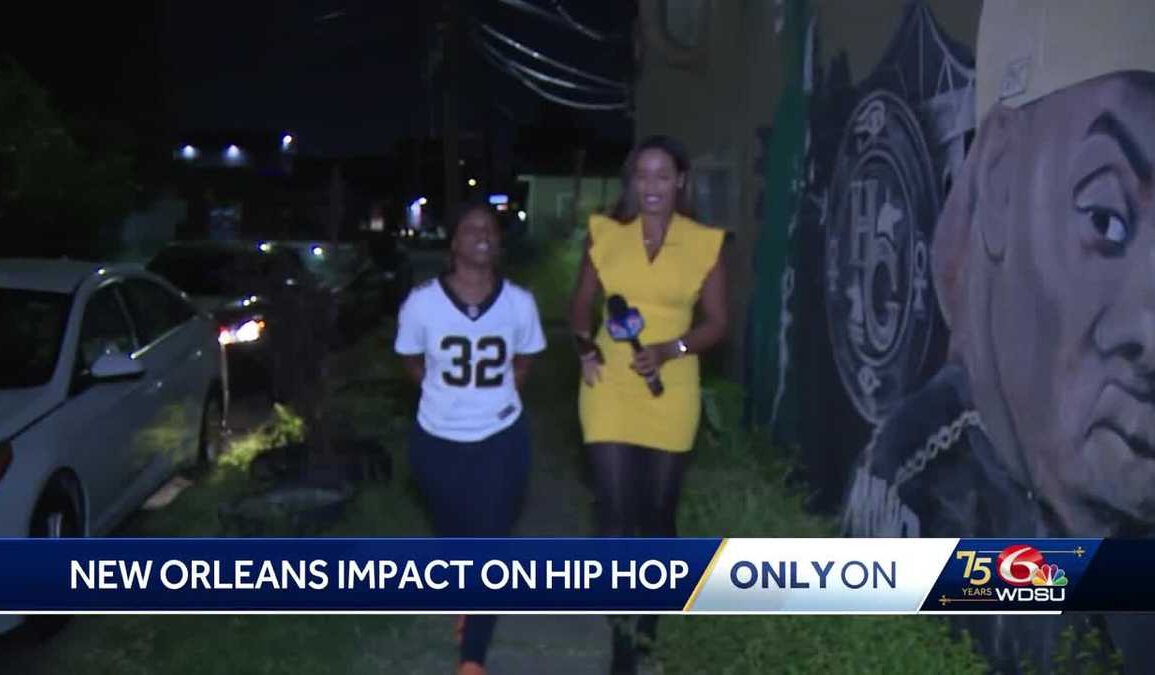
This year, we celebrate 50 years of hip-hop — an art form widely believed to have been born at a party in the Bronx in August 1973. But New Orleans has also played a major role in the hip-hop we listen to today. When and did hip hop start in New Orleans?Gregory D, a pioneer of New Orleans rap, said “Imma have to say ’83, ’84. Maybe ’82. Just clowning around with it. That was the origin of everything.” “Gregory D set the tone of rapping. That was the rapping part of New Orleans. Before we kicked into bounce there,” said DJ Jubilee. Partners N Crime, Walter Kango Slim Williams said, “I cannot remember the exact year. But one of the first Hip Hop artists I remember in New Orleans was the Ninja Crew. “”Black menace most definitely inspired me. 3-9 Pose, Tim Smooth, Bust Down. We have so many legendary artists. I am happy to be at the forefront to see everyone. When we were young kids, we made our dreams come true,” said Mia X. Still, when hip hop music took a hold in New Orleans, artists said it would never let go. “New Orleans has the most unique accent. When we rap on beats our cadence is different. We have a gumbo and jambalaya of flavor. Our style has been sampled and borrowed from every coast. All over hip-hop, you can hear our influence,” Mia X said. A place where other female artists like the Legendary M$. Tee was able to add her talents into the mix. Legendary M$. Tee said, “The ’90s was really the years. Because we were introducing a sound. We were introducing bounce music. For a long time, New York had it- for like 10 years straight. So they weren’t really respecting the south.” “Bounce didn’t come to late ’80,’89, ’90, That’s when we first kicked in. And remember, Bounce didn’t have a name. I’m the one who gave it the name in 1993,” said Jubilee.But artists said years ago, bounce and rap in New Orleans were separate. “When we speak of hip hop, the whole genre. hip hop is just a seed. It grew all these branches. Some branched off to be bounce music,” said Walter Kangol Slim Williams, with Partners N Crime. The two created a different type of style. With the emergence of two rap labels, No Limit and Cash Money Records. Mia X said the labels brought ownership to rap during a time when it was lacking.”We weren’t getting major deals, but we were starting our own record companies. That’s where the ownership came in at.” Ghinn with Hard Head Records said, “Juvenile, BG, Turk. They revolutionized it. When it got to them, they revolutionized the bling shiny type of rapper. At first, it was just a dark rapper. They put shine and color into it.”Officially putting New Orleans sound on the map, for generations to come. G.I Peachez is the sister of Soulja Slim. “My brother is a big part of the No Limit culture. That also inspired me to really want to do music. He was so good at it. And I remember being like four, and him being picked up by limousines, and I’m thinking he really is a star.”And making it easier for bounce artists like Big Freedia. Those who helped cultivate what we know as New Orleans music today like The Ghetto Twins said, “We have our Master P’s, Lil Waynes, Mia Xs. And now the newcomers doing their thing. So we support them as well.”The artists said there is no way New Orleans influence can be discounted from what we know as hip-hop. “As long as we have the artists who are willing to keep this genre alive, it’s going to grow and grow. 32 years ago, I was there. We are going into 2024. I would not be surprised to see bounce music go another 32 years,” said Mia X.”Our sound has been taken in a lot of different places and markets. It’s on a lot of records that just went out of the roof. We’ve affected them and given them a new sound. That they can use and take. Yes, they stole it. Shame on us,” said Gregory D.
This year, we celebrate 50 years of hip-hop — an art form widely believed to have been born at a party in the Bronx in August 1973.
But New Orleans has also played a major role in the hip-hop we listen to today.
Advertisement
When and did hip hop start in New Orleans?
Gregory D, a pioneer of New Orleans rap, said “Imma have to say ’83, ’84. Maybe ’82. Just clowning around with it. That was the origin of everything.”
“Gregory D set the tone of rapping. That was the rapping part of New Orleans. Before we kicked into bounce there,” said DJ Jubilee.
Partners N Crime, Walter Kango Slim Williams said, “I cannot remember the exact year. But one of the first Hip Hop artists I remember in New Orleans was the Ninja Crew. “
“Black menace most definitely inspired me. 3-9 Pose, Tim Smooth, Bust Down. We have so many legendary artists. I am happy to be at the forefront to see everyone. When we were young kids, we made our dreams come true,” said Mia X.
Still, when hip hop music took a hold in New Orleans, artists said it would never let go.
“New Orleans has the most unique accent. When we rap on beats our cadence is different. We have a gumbo and jambalaya of flavor. Our style has been sampled and borrowed from every coast. All over hip-hop, you can hear our influence,” Mia X said.
A place where other female artists like the Legendary M$. Tee was able to add her talents into the mix.
Legendary M$. Tee said, “The ’90s was really the years. Because we were introducing a sound. We were introducing bounce music. For a long time, New York had it- for like 10 years straight. So they weren’t really respecting the south.”
“Bounce didn’t come to late ’80,’89, ’90, That’s when we first kicked in. And remember, Bounce didn’t have a name. I’m the one who gave it the name in 1993,” said Jubilee.
But artists said years ago, bounce and rap in New Orleans were separate.
“When we speak of hip hop, the whole genre. hip hop is just a seed. It grew all these branches. Some branched off to be bounce music,” said Walter Kangol Slim Williams, with Partners N Crime.
The two created a different type of style. With the emergence of two rap labels, No Limit and Cash Money Records. Mia X said the labels brought ownership to rap during a time when it was lacking.
“We weren’t getting major deals, but we were starting our own record companies. That’s where the ownership came in at.”
Ghinn with Hard Head Records said, “Juvenile, BG, Turk. They revolutionized it. When it got to them, they revolutionized the bling shiny type of rapper. At first, it was just a dark rapper. They put shine and color into it.”
Officially putting New Orleans sound on the map, for generations to come. G.I Peachez is the sister of Soulja Slim.
“My brother is a big part of the No Limit culture. That also inspired me to really want to do music. He was so good at it. And I remember being like four, and him being picked up by limousines, and I’m thinking he really is a star.”
And making it easier for bounce artists like Big Freedia. Those who helped cultivate what we know as New Orleans music today like The Ghetto Twins said, “We have our Master P’s, Lil Waynes, Mia Xs. And now the newcomers doing their thing. So we support them as well.”
The artists said there is no way New Orleans influence can be discounted from what we know as hip-hop.
“As long as we have the artists who are willing to keep this genre alive, it’s going to grow and grow. 32 years ago, I was there. We are going into 2024. I would not be surprised to see bounce music go another 32 years,” said Mia X.
“Our sound has been taken in a lot of different places and markets. It’s on a lot of records that just went out of the roof. We’ve affected them and given them a new sound. That they can use and take. Yes, they stole it. Shame on us,” said Gregory D.







